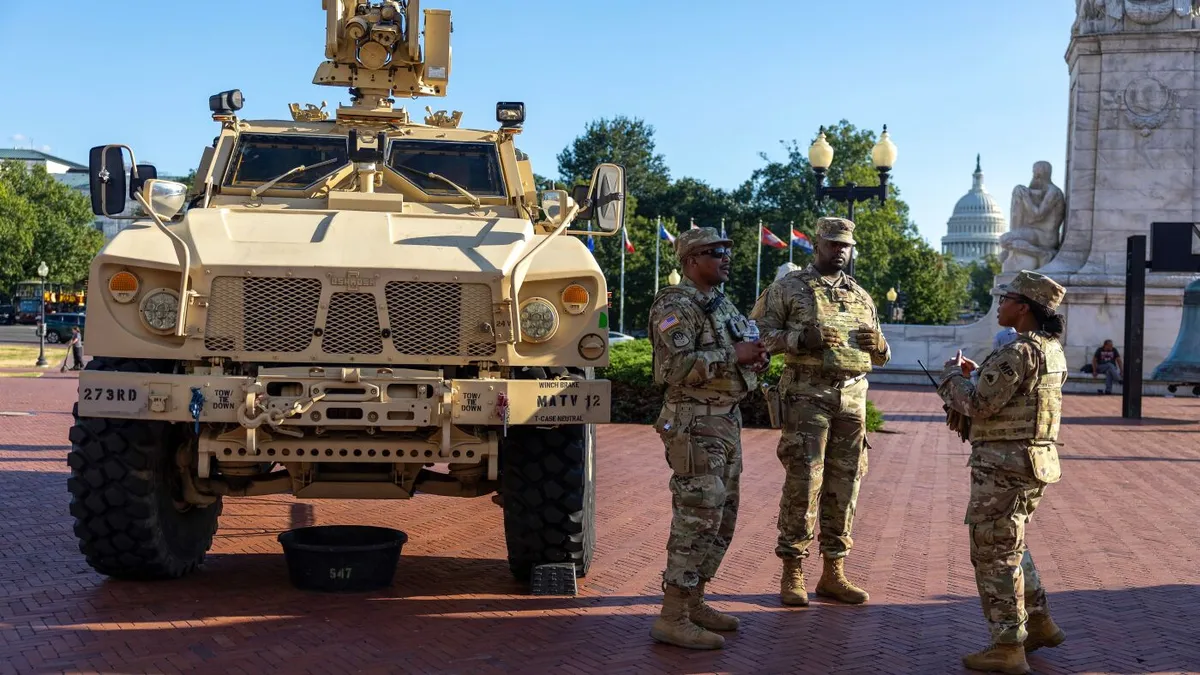
A little over three weeks ago, President Trump took a significant step to address crime in the nation’s capital by placing the Washington, D.C., police under federal control. Alongside this move, he deployed the National Guard to the streets of D.C. to help combat rising crime rates. Although crime in the District of Columbia had already begun to decline following a spike during the pandemic, the Trump administration has characterized this operation as a major achievement. "We've had some incredible results," Trump stated during a visit with law enforcement officers in southeast D.C. "It's like a different place. It's like a different city." The president, who travels in an armored limousine surrounded by a substantial security detail, expressed his newfound sense of safety, saying, "I feel very safe now."
On Tuesday, the White House announced that a total of 1,669 arrests had been made since the federal surge began on August 7. A significant portion of these arrests pertained to immigration-related offenses. However, despite numerous requests from NPR for further information, the administration has yet to provide the names or specific charges of the arrested individuals.
The legal framework in Washington, D.C. is unique, as there is no local district attorney's office. Instead, the U.S. Attorney's Office handles both local and federal crimes. The D.C. Attorney General's Office is responsible for prosecuting juvenile crimes and certain adult misdemeanors related to local offenses. Local crime prosecutions are processed through the Superior Court of the District of Columbia, whereas federal cases are directed to the U.S. District Court.
During the initial two weeks of the federal intervention, from August 11 to August 25, nearly 1,100 defendants saw their cases move through Superior Court. Legal professionals in the courthouse reported being overwhelmed, with some court sessions extending past 1 a.m., which is highly unusual. Among the more than 1,050 defendants processed, prosecutors charged approximately 20% with felonies, which include serious offenses such as drug and gun crimes. The remaining 80% of cases consisted of misdemeanors, traffic offenses, and instances where prosecutors opted to drop the case entirely.
Defense attorneys highlighted that prosecutors sometimes choose not to pursue cases—a process referred to as "no papering"—for various reasons, including insufficient evidence or the minor nature of the alleged offense. In the first week of the federal takeover, around 17% of cases were dropped, but this figure sharply declined to less than 1% in the second week, raising concerns among defense attorneys about the changing criteria for case prosecution.
In the first two weeks following the federal intervention, at least 35 cases were filed and unsealed in federal court. An NPR analysis revealed that more than half of these cases involved gun charges or a combination of gun and drug offenses. One notable example involved Anthony Grant, who was pulled over for failing to signal. Officers allegedly discovered a loaded handgun, 143.5 grams of crack cocaine, plastic baggies, and $900 in cash in his vehicle. Given his extensive criminal history involving drugs and firearms, a judge ordered him to remain in custody without bond.
Another prevalent charge among these federal cases involved assaulting, resisting, or impeding federal officers. Some instances were violent, such as a defendant striking a federal agent with a vehicle during an attempted arrest at a gas station. However, other cases were less severe; for instance, one defendant, Sean Charles Dunn, reportedly threw a sub sandwich at a federal agent, while another, Scott Pichon, allegedly spat at two National Guard troops while riding a scooter.
Despite the aggressive law enforcement efforts, several cases have encountered significant obstacles in federal court. A prime example is the gun case against Torez Riley, where police claimed they found two firearms in his satchel during a stop at a Trader Joe's grocery store. U.S. Magistrate Judge Zia Faruqui criticized the police's actions, stating that Riley appeared to have been unfairly targeted due to his race and the nature of his bag. Faruqui described the search as "the most illegal search I've seen in my life," leading to the dismissal of the case by the U.S. Attorney's Office.
Additionally, some cases have faltered during grand jury proceedings—a rare occurrence in D.C. Recently, grand juries have rejected charges proposed by prosecutors, including a case involving the defendant who threw a sandwich at a federal agent, resulting in a downgraded charge to a misdemeanor.
As the federal control over D.C. police continues, it remains to be seen how these legal challenges will evolve and what long-term impact this surge in federal law enforcement will have on crime rates in the nation’s capital.